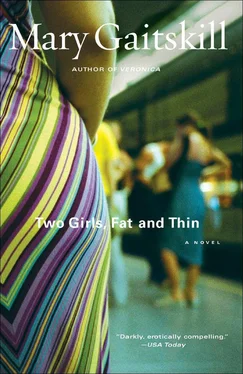Mary Gaitskill - Two Girls, Fat and Thin
Здесь есть возможность читать онлайн «Mary Gaitskill - Two Girls, Fat and Thin» весь текст электронной книги совершенно бесплатно (целиком полную версию без сокращений). В некоторых случаях можно слушать аудио, скачать через торрент в формате fb2 и присутствует краткое содержание. Год выпуска: 2012, Издательство: Simon & Schuster, Жанр: Современная проза, на английском языке. Описание произведения, (предисловие) а так же отзывы посетителей доступны на портале библиотеки ЛибКат.
- Название:Two Girls, Fat and Thin
- Автор:
- Издательство:Simon & Schuster
- Жанр:
- Год:2012
- ISBN:нет данных
- Рейтинг книги:5 / 5. Голосов: 1
-
Избранное:Добавить в избранное
- Отзывы:
-
Ваша оценка:
- 100
- 1
- 2
- 3
- 4
- 5
Two Girls, Fat and Thin: краткое содержание, описание и аннотация
Предлагаем к чтению аннотацию, описание, краткое содержание или предисловие (зависит от того, что написал сам автор книги «Two Girls, Fat and Thin»). Если вы не нашли необходимую информацию о книге — напишите в комментариях, мы постараемся отыскать её.
Review) create a haunting and unforgettable journey into the dark side of contemporary life and the deepest recesses of the soul.
Two Girls, Fat and Thin — читать онлайн бесплатно полную книгу (весь текст) целиком
Ниже представлен текст книги, разбитый по страницам. Система сохранения места последней прочитанной страницы, позволяет с удобством читать онлайн бесплатно книгу «Two Girls, Fat and Thin», без необходимости каждый раз заново искать на чём Вы остановились. Поставьте закладку, и сможете в любой момент перейти на страницу, на которой закончили чтение.
Интервал:
Закладка:
The next morning she watched her parents at breakfast. Her mother was pink and perfectly madeup, briskly leading the breakfast conversation as usual. What Justine now noticed was the reason she was leading it; her father, dourly pushing his eggs around on his plate, was making polite noises, not really responding to her. At first she thought it was because they’d had a fight, but as the week went on she realized he was acting as he always did. Justine thought: He doesn’t like her either.
The thought was disconcerting, and she pushed it away, but it kept coming back, especially when her father began staying away for overnight conferences. Sometimes it would make her gloat, sometimes she’d try to hurt her mother with falsely innocent questions about where dad was. Other times she’d imagine her mother looking old and weak, crying on the floor while her father scorned her, and it would fill her with fear and pity. She would hate her father then and have fantasies of yelling at him, warning him to leave her mother alone. But she never heard him say those things to her mother again, although some nights she lay awake listening for it. Sometimes too, her father would stop ignoring her mother and would act the way he used to, smiling at her, hugging her shoulders, standing beside her, handsome and proud, calling her “my lady.” When this happened, the things Justine had heard that night seemed like something that had happened between people who were only pretending to be her parents.
At the beginning of October a new kid entered Justine’s class. Her name was Cheryl Thomson. She was big, she had acne, and she wore old plaid skirts what were obviously not from Sears or Wards. This would’ve been all right; some very cool kids — Dody among them — dressed this way. But they had a sloppy panache, a looselimbed grace that made their flapping shirt-tails and shifting skirts seem sassy; halting, thick-bodied Cheryl did not. She sat in her seat with her stubby hands in her lap, talking to people politely before class, a dull dreamy look coating her gray eyes. Then the teacher came in and, in an innocent effort to help everyone get to know the new student, opened class by asking Cheryl questions meant to gently reveal her, for example, “What is your favorite food?” Cheryl did all right with that, but when asked about music, instead of saying “the Monkees” or “the Beatles” she answered “country music,” causing a ripple of disbelief to alert the room. From that point on, every answer she gave confirmed her to be a hopeless alien in the world of primary-colored surfaces. She wanted to be a fire fighter when she grew up! Her favorite TV show was Andy of Mayberry ! She liked to go fishing! Every answer seemed to come out of some horrible complex individuality reeking with humanity, the clarity and trust in her soft voice made them squirm with discomfort.
In the lunchroom, everybody was talking about how queer she was. Her second day at school, somebody tripped her in the hall; the following week somebody put a tack on her seat. When she sat on it, she cried, and little Marla Jacob sneered, “God, what an emotional!” From that day on she was known as “Emotional,” the worst insult imaginable.
Her presence changed the whole composition of the class, uniting everyone, even other unpopular kids, against her. Everything she said became further proof of her stupidity, her social failure. Every ugly and ridiculous thing introduced into any discussion, in the classroom, on the playground, at the mall, was “like Emotional.” She was most often taunted verbally, but there was also physical abuse — a shower of orchestrated spit balls, an ambush by a dozen or so boys and girls who struck her legs and arms with their belts.
Emotional’s reaction was by turns angry, hurt, bewildered, but her most constant expression was one of helpless good nature. She was too even tempered to remain angry or brooding; she always tried to reverse the tide against her, to make jokes, to be positive, to join in. Once Justine saw a smiling face drawn in Magic Marker on her notebook with the words “Happy-Go-Lucky” written underneath and knew, sickeningly, that it was true, in spite of everything.
Of course, Justine took part in the Emotional pogrom. As with all the other little social massacres she’d taken part in, she was more a goader and abettor than an attacker; she was too small to be a real bully and not aggressive enough to be a ringleader. Besides, she was secretly too ambivalent. When she looked at the chalky, rigid face of some kid who was being shoved to and fro between Deidre and Debby, she felt deep, excruciating enjoyment as well as equally deep discomfort that she deliberately provoked, like she’d chew a cold sore. These two feelings met and skewered her between them while she giggled and cajoled and incited her friends to riot, making her feel monstrously alive and enlarged beyond the boundaries of herself, exploding into the world like her memory of tornado-splayed Dody — yet unable to bear being in the world, turning in on herself like an insect run through with a needle.
These feelings were magnified by Emotional, who, within a few months, became something other than human. Justine always joined in the teasing, yet the sight of Emotional’s unhappy face brought darkness up from some thoughtless pit within her, made her turn away and frown when she should’ve been laughing. When she looked at Emotional she looked into the face of her most private fantasy, the victim crucified before a jeering crowd.
To Justine’s discomfort, Emotional began appearing in her dreams. The most outstanding of these dreams featured her and Emotional in the front-line trenches of a war. There were other people in the trench, but there existed between her and the class queer a deep unspoken friendship that was expressed in meaningful glances and, at one point, a fraught hand clasping. The height of the dream was reached when Justine lay injured and paralyzed from an enemy blast, and Emotional ran to her side, ripping off a piece of her blouse to bind Justine’s wounds.
It was perplexing: in many of the dreams Emotional helped or even rescued Justine in various ways, which in real life she couldn’t possibly do. If anything, brooded Justine, she could help Emotional if she wanted to. If she wanted to. Of course, she didn’t want to, but what if she did? She began to nurse strange fantasies of advising Emotional on how to improve her wardrobe, even accompanying her to the mall for a shopping trip, sitting with her at lunch, walking home with her, hearing the weird things that doubtless went on in her mind.
Emotional reappeared in her dreams, smiling and waving.
One morning after a particularly mysterious and moving dream, Justine found herself in a gym class that had been divided into groups, each group performing various athletic acts. Emotional was in her group. As usual, whenever it was Emotional’s turn, the others would try to make her fail. When everyone had to jump over a pole held by two kneeling girls, all would finish their jump with a pause by a pole-bearer and a whispered “make Emotional trip!” Which they did; when Emotional made her jump, the pole came up mid-leap. There was an amusing facial wobble, a mid-air flounder, and Emotional thudded down on her hands and knees. She cried; everybody laughed and said, “God, Emotional!” But Justine, although she laughed too, felt unwanted remorse. This remorse became a secret weight of gentleness and sorrow within her which stayed, no matter how hard she tried to kill it. That afternoon she decided she was going to stop hurting Emotional.
She didn’t want to voice her new tolerance to anyone at school, but what good was it if nobody knew about it? If Emotional didn’t know about it? She would see Emotional and itch with curiosity about her. What did it feel like to be despised and victimized by everyone? How would Emotional react if she knew that in this nest of enemies she had an ally?
Читать дальшеИнтервал:
Закладка:
Похожие книги на «Two Girls, Fat and Thin»
Представляем Вашему вниманию похожие книги на «Two Girls, Fat and Thin» списком для выбора. Мы отобрали схожую по названию и смыслу литературу в надежде предоставить читателям больше вариантов отыскать новые, интересные, ещё непрочитанные произведения.
Обсуждение, отзывы о книге «Two Girls, Fat and Thin» и просто собственные мнения читателей. Оставьте ваши комментарии, напишите, что Вы думаете о произведении, его смысле или главных героях. Укажите что конкретно понравилось, а что нет, и почему Вы так считаете.












